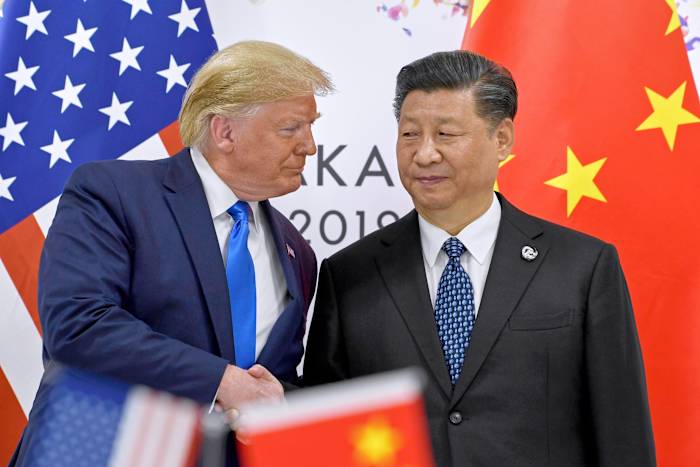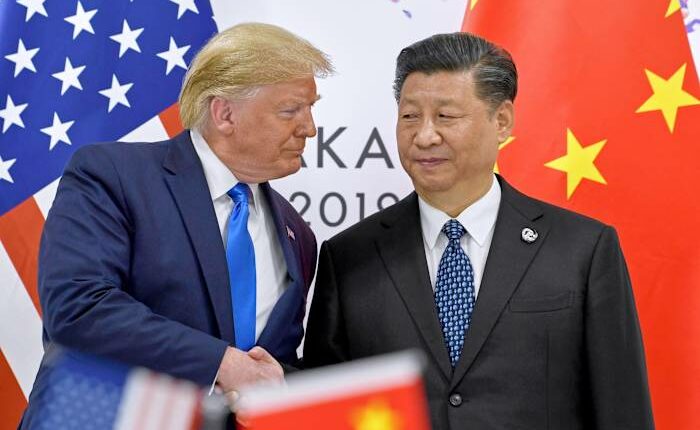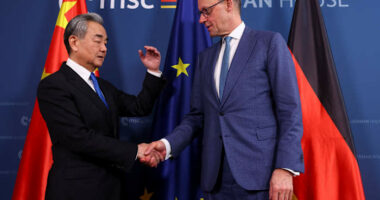Share this @internewscast.com

WASHINGTON – On Monday, President Donald Trump confidently asserted that the United States is held in “great respect” by China, expressing optimism about striking a “fantastic deal” with Chinese President Xi Jinping in their upcoming meeting.
Trump’s comments came in response to Beijing’s recent decision to broaden its export controls on rare earth materials, crucial components in products like smartphones, fighter jets, and electric cars. The president made these remarks while hosting Australian Prime Minister Anthony Albanese at the White House, where both leaders celebrated a new agreement aimed at counterbalancing China’s dominance in processing these vital minerals.
“I believe we are on the path to securing an outstanding agreement with China,” Trump stated. “This trade deal will be remarkable for both nations and beneficial for the entire world.”
When questioned about China’s strategic advantage, Trump acknowledged that Beijing “attempted to leverage rare earths against us, and I responded with tariff threats.” Nonetheless, he remained optimistic that his strong rapport with Xi would facilitate a “very fair deal.”
The international community is closely monitoring the anticipated meeting between Trump and Xi, as failure to reach an accord could have significant implications for both bilateral relations and the global economy.
Trump confirmed that he anticipates a meeting with Xi later this month during the Asia Pacific Economic Cooperation summit, which comprises 21 member economies. Although Beijing has yet to announce Xi’s participation in the South Korea summit, such details often emerge closer to the event.
Trump touts tariffs as a powerful tool
with China
The president has threatened to impose a new 100% tariff on China in response to Beijing’s expanded rules on rare earth products. And he said Monday that it has already had results.
“Now, they’re treating us with great respect,” Trump said. “Now, we’ll see what happens. I said, if we don’t make a deal, I’m putting on an additional 100% on November 1. I think we’ll make a deal.”
Since returning to the White House, Trump has levied additional 30% across-the-board tariffs on China. Trump said the total rate on Chinese goods is about 55% to 57% and the country has paid the U.S. “hundreds of billions of dollars worth of money for tariffs.”
Beijing, however, has indicated it would play hardball.
“Threatening high tariffs is not the right way to deal with China,” Lin Jian, a spokesperson for the Chinese foreign ministry, said last week in response to Trump’s new tariffs threat.
At the meeting with Albanese, Trump said he has other options to use against China: “They can’t get parts for their airplanes. We build their airplanes.”
Still, he said he prefers reaching a deal. “I want to be good to China. I love my relationship with President Xi,” Trump said.
Trump isn’t worried about China attacking Taiwan
Trump also dismissed concerns that Beijing could soon attack the self-governed island of Taiwan. That is because, he said, the U.S. is far superior in military power.
“It’s not even close,” Trump said. “We have the best equipment. We have the best of everything, and nobody’s going to mess with that.”
The United States is obligated by its own laws to give military support to Taiwan, which split from China in 1949 during a civil war. Beijing claims sovereignty over the island and vows to seize it by force if necessary to achieve what it says to be “the unification of the motherland.”
Trump acknowledged that Taiwan is “the apple of his eye” for Xi but said: ”I don’t see anything happening. We have a very good trade relationship.”
When asked if he could yield to Beijing’s pressure not to support Taiwan independence in exchange for a deal, Trump said, “Well, I’m not going to talk about that.”
Beijing removes a top trade negotiator
Meanwhile, Li Chenggang has been ousted as China’s top trade negotiator after co-leading the last four rounds of talks with the U.S. In a routine, bullet-style announcement of removals and appointments, Beijing said Monday that Li was removed from his post as China’s permanent representative to the World Trade Organization. No reason was given.
He was replaced by Li Yongjie, deputy international trade representative, who recently held trade talks with Ecuador.
The announcement coincided with Treasury Secretary Scott Bessent’s recent criticisms of Li Chenggang. At a press conference last week, Bessent made a rare public airing of displeasure, saying Li “showed up here with very incendiary language on August 28,” has “gone rogue” and was “very disrespectful.”
“He showed up uninvited in Washington and said, quote, China will cause global chaos if the port shipping fees go through,” Bessent said, referring to the U.S. plan to charge port fees on China-linked vessels.
Late last week, Chinese Vice Premier He Lifeng had a video call with Bessent and U.S. Trade Representative Jamieson Greer. The sides held a “candid, in-depth and constructive exchange” and agreed to hold a new round of trade talks as soon as possible, according to China’s official Xinhua news agency.
Bessent said last week that he and his Chinese counterpart would likely meet in Malaysia soon to prepare for a leaders summit.
Copyright 2025 The Associated Press. All rights reserved. This material may not be published, broadcast, rewritten or redistributed without permission.










